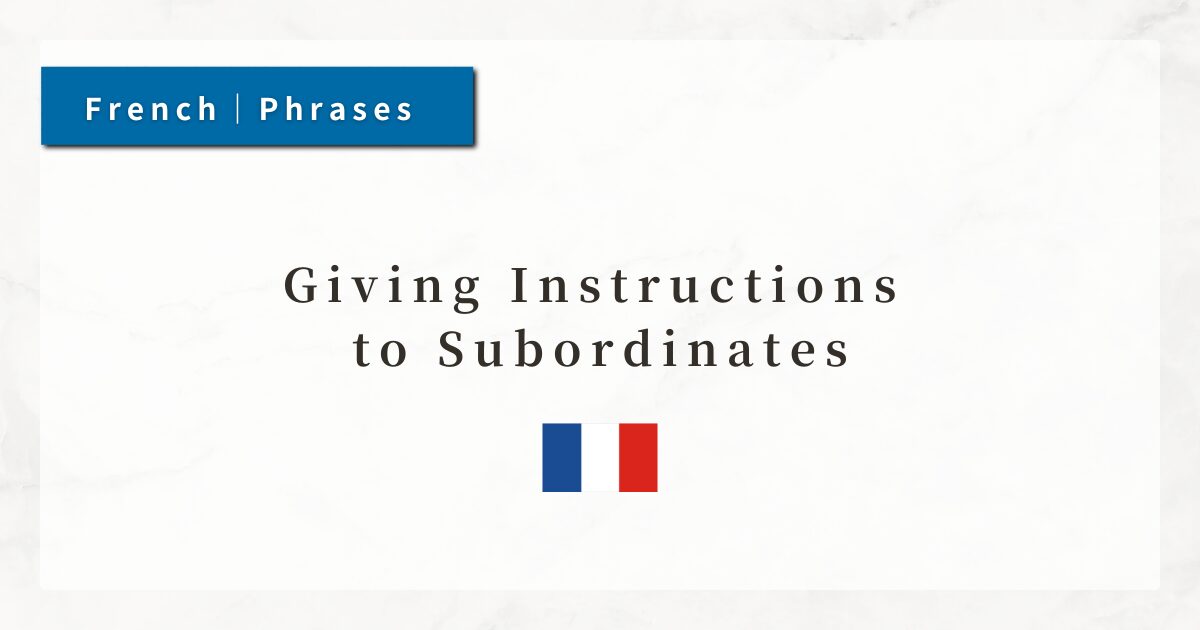#65 Giving Instructions to Subordinates|French Business Conversation

In the workplace, supervisors often need to give concrete instructions to subordinates, such as “Please prepare this document” or “Check the meeting schedule.”
In French, there are various ways to give directions—from direct commands using the imperative form to more polite requests.
This lesson explains useful French expressions and grammar points for giving instructions in a business context.
Dialogue

Bonjour, pouvez-vous préparer le dossier pour la réunion de cet après-midi ?
(Hello, could you prepare the file for this afternoon’s meeting?)

Oui, je m’en occupe tout de suite.
(Yes, I will take care of it right away.)

Merci. Et envoyez aussi un e-mail de confirmation à l’équipe, s’il vous plaît.
(Thank you. And please also send a confirmation email to the team.)

Très bien, ce sera fait avant midi.
(Understood. It will be done before noon.)
1. Simple Instructions with the Imperative
The imperative form is used to directly tell someone to “do something.”
- Préparez le dossier.
(Prepare the file.) - Envoyez un e-mail.
(Send an email.)
In business settings, it is more appropriate to use the vous-form (formal). The tu-form (Prépare, Envoie) is reserved for familiar contexts.
The imperative is used without a subject pronoun. For negation, place “Ne … pas” around the verb.
- Ne partez pas avant la réunion.
(Do not leave before the meeting.)
2. Polite Requests with Pouvez-vous … ?
Instead of the imperative, you can use “Pouvez-vous … ?” (Could you … ?) to make your request sound softer and more polite.
- Pouvez-vous préparer le dossier pour demain ?
(Could you prepare the file for tomorrow?) - Pouvez-vous vérifier les chiffres ?
(Could you check the figures?)
Although this is grammatically a question, in practice it functions as a polite way of giving instructions.
3. Adding Politeness with s’il vous plaît
Adding “s’il vous plaît” (please) to the end of a request makes it more formal and courteous.
- Envoyez le rapport, s’il vous plaît.
(Please send the report.) - Vérifiez les horaires, s’il vous plaît.
(Please check the schedule.)
4. Variations in Giving Instructions
The same instruction can be expressed in different ways depending on the context and relationship.
- Je voudrais que vous prépariez le dossier.
(I would like you to prepare the file.)
→ polite, slightly formal - Il faut envoyer ce mail aujourd’hui.
(This email must be sent today.)
→ emphasizes obligation - Merci de vérifier les chiffres.
(Please check the figures.)
→ soft, courteous request
Using such variations helps convey requests more naturally and reduces the impression of giving orders.
5. Example Responses from Subordinates
It is equally important for subordinates to know how to respond appropriately.
- Oui, je m’en occupe.
(Yes, I’ll take care of it.) - Ce sera fait tout de suite.
(It will be done immediately.) - Pas de problème.
(No problem.) - D’accord, je vais le faire.
(Alright, I’ll do it.)
Knowing suitable responses ensures smooth communication between supervisors and subordinates.
Summary
- Imperative (Préparez, Envoyez)
→ Direct and straightforward instructions. - Pouvez-vous … ?
→ Softer, polite request form. - s’il vous plaît
→ Adds politeness to requests. - Variations
→ Expressions like Il faut …, Merci de … allow instructions to sound more natural. - Responses
→Phrases such as “I’ll do it right away” or “I’ll take care of it” are appropriate.




